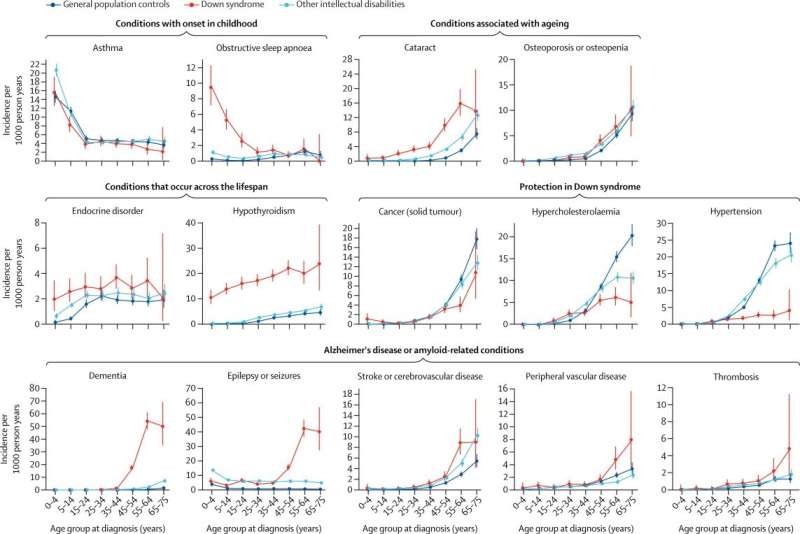This article has been reviewed according to Science X's editorial process and policies. Editors have highlighted the following attributes while ensuring the content's credibility:
fact-checked
peer-reviewed publication
trusted source
proofread
Tracking multiple morbidities across the lifespan in people with Down syndrome

New research from the Institute of Psychiatry, Psychology & Neuroscience (IoPPN) at King's College London has explored the health experiences of people with Down Syndrome in an effort to better understand how the specific needs of people living with the condition compare to people with other forms of intellectual disability.
The report, published in The Lancet Public Health, is the first of its kind to research multiple morbidity across the lifespan in people with Down Syndrome. Researchers hope that this will help to ensure people living with the syndrome have access to the correct monitoring, support and treatment for health conditions at the right ages.
Previous research has found that people with Down syndrome die 28 years younger than the general population, with many of these deaths being from avoidable causes that can be reduced with better health care.
Using information sourced from GP practices in the U.K., researchers compared the health records of 10,204 people with DS to 69,150 people with ID and 39,814 members of the general population acting as the control.
Researchers found that people with DS had an increased risk of dementia, hypothyroidism, epilepsy and hematological malignancy (cancers that begin in blood forming tissue) compared to people with other intellectual disabilities, but were less at risk of asthma, cancer (solid tumor), ischemic heart disease and particularly hypertension.
"The results of this analysis provide health professionals with a more detailed understanding of the health needs of people with Down syndrome, and those with an intellectual disability, which will help to target care for these groups to reduce inequalities," says Professor André Strydom, the study's senior author.
The study also found that people with Down syndrome who have one health condition are more likely to have certain other conditions. For example, people who are obese are also more likely to have obstructive sleep apnea, dementia, and thyroid problems, while those who had one cardiovascular disease were more likely to also have another such as ischemic heart disease or stroke.
"The passing of the Down Syndrome Act in April 2022 was a major achievement for the DS community. As policies connected to this Act continue to be developed, the findings of this study will be important to help shape initiatives that could help to improve the health of people with Down syndrome so that they can live healthier and longer lives," says Dr. Asaad Baksh, one of the first authors from King's IoPPN and the South London and Maudsley NHS Foundation Trust
More information: R Asaad Baksh et al, Multiple morbidity across the lifespan in people with Down syndrome or intellectual disabilities: a population-based cohort study using electronic health records, The Lancet Public Health (2023). DOI: 10.1016/S2468-2667(23)00057-9


















